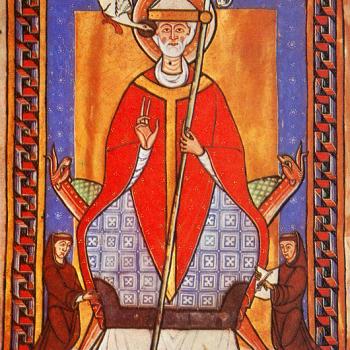You argue in your book that there is, across the span of the Bible as it was written over the centuries, an evolving understanding of God that moves from vengeance and wrath toward a more mature view of God as full of forgiveness and love. Yet Jews would not agree with this characterization of the God of the Hebrew scriptures, since they find many passages that speak of God's mercy and loving-kindness, and Jesus spends a fair amount of time talking about hell and wrath. Do you think you simplify matters a bit to pose this evolutionary model?
I think the way you've described it does simplify it, but I don't think that's the way I express it in the book. I would never ever say that there is no loving characterization of God in the Hebrew scriptures; in fact, I quote the Hebrew scriptures in making my point. Nor would I ever say that there is an orderly, neat progression. It's terribly messy, full of regressions and switchbacks. After all, it's human beings we're dealing with!
I devoted a whole book to the subject of hell and wrath [The Last Word and the Word After That (2005)], and I try to make clear there that what Jesus says about hell and wrath is very different from what we say Jesus says. For example, Jesus never says, "If you're not a Christian, you're going to hell." He never said, "If you don't believe in the inerrancy of scripture or penal substitutionary atonement theory, you're going to hell." But I've had quite a few Christians say exactly these things to me. But Jesus does say, "If you call your brother an idiot, you're going to hell." Or "If you aren't compassionate to the poor, you're going to hell." Now why he says that, and what he's trying to get through to his hearers by saying that -- that's a big subject.
Here's the big issue, as I see it: Is the greatest gift of God to humanity the inspiration of the Bible, or the incarnation of Christ? I believe the inspired Bible itself teaches that it is the latter. I quote several verses to that effect in the book, but just to give one example -- take Hebrews 1:1-4, where Jesus is presented as a revelation that goes above and beyond the previous revelations. I am with Martin Luther in this, who said that the Bible is like the manger: it presents Jesus to us. It is precious because it bears witness to Jesus, but it shouldn't be confused with the Word made flesh.
And I'm also concerned, as I explain in the book, that we have allowed a terribly unfortunate reading of Revelation 19 to implant an image of a violent second-coming Jesus in our imaginations that effectively supplants the nonviolence of the Jesus of the gospels. Even if people don't agree with much in my book, I at least hope they'll give that concern a second thought.
My belief is that the Jesus of Matthew, Mark, Luke, and John -- the Jesus celebrated by Paul and the apostles -- presents to us the image of God in all God's radiance. I believe that "For God so loved the world that he gave" not just a book, but "his only Son." The book is indeed precious, precisely because it presents to us the Word made flesh. To be a Christian -- at least a new kind of Christian, as I see it -- is to see God first and foremost revealed in Jesus, and to see the Holy Scriptures as unspeakably precious because they bear witness to Jesus, holding him like the manger. That's why I'm a Christian -- because I believe God was in Christ, reconciling the world to God, and reconciling us to one another. And that's why I still consider myself an evangelical, because I believe that the good news of Jesus Christ is good news for all creation, and is worth sharing with joy.
Brian McLaren is married and has four children, and has traveled around the world in his capacity as an author, pastor, and public speaker. To learn more about McLaren and his work, visit his official website.
Be sure to see the interview at the Mainline Protestant Portal as well. Or for more articles like this, see the Evangelical Portal.
Timothy Dalrymple is the manager of the Evangelical Portal at Patheos. Educated at Stanford, Oxford, Princeton Theological Seminary, and Harvard, he writes on religion, politics, culture, and faith.




